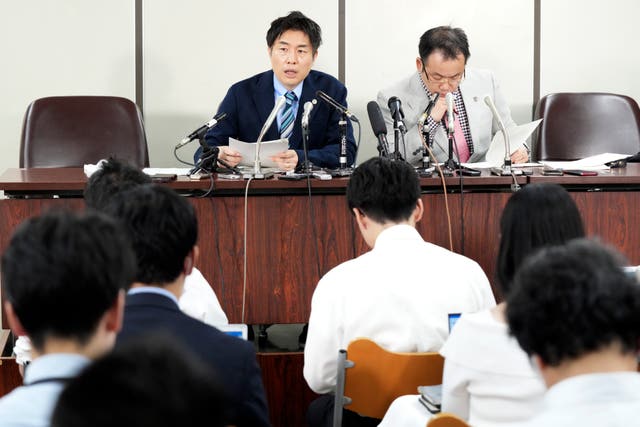
Shelagh Fogarty 1pm - 4pm
25 October 2023, 12:54

The ruling was the top court’s first on the constitutionality of a 2003 law requiring the removal of sex organs for a state-recognised gender change.
Japan’s Supreme Court has ruled that a law requiring transgender people to undergo sterilisation surgery in order to officially change their gender is unconstitutional.
The decision by the top court’s 15-judge Grand Bench on Wednesday was its first on the constitutionality of Japan’s 2003 law requiring the removal of sex organs for a state-recognised gender change, a practice long criticised by international rights and medical groups.
The decision, which requires the government to reconsider the law, is a first step towards allowing transgender people to change their identity in official documents without getting sterilised.
But it was not a full victory because the Supreme Court sent the case back to the High Court to further examine the requirement for gender-affirmation surgery.

The case was filed in 2020 by a claimant whose request for a gender change in her family registry – to female from assigned male at birth – was turned down by lower courts.
The decision comes at a time of heightened awareness of issues surrounding LGBTQ+ people in Japan and is a partial victory for that community.
The judges unanimously ruled that the part of the law requiring sterilisation for a gender change is unconstitutional, according to the court document and the claimant’s lawyers.
But the top court ordered the case to be sent back to the High Court for further review of the requirement for gender-affirmation surgery – a decision the claimant’s lawyers said is regrettable because it delays the settlement of the issue.
Under the law, transgender people who want to have their gender assigned at birth changed on family registries and other official documents must be diagnosed as having gender dysmorphia and undergo an operation to remove their sex organs.
Other requirements are that they are unmarried and do not have children.
LGBTQ+ activists in Japan have recently stepped up efforts to pass an anti-discrimination law since a former aide to Prime Minister Fumio Kishida said in February that he would not want to live next to LGBTQ+ people and that citizens would flee Japan if same-sex marriage were allowed.

But changes have come slowly and Japan remains the only Group of Seven member that does not allow same-sex marriage or legal protections, including an effective anti-discrimination law.
The claimant, who is only identified as a resident in western Japan, originally filed the request in 2020, saying the surgery requirement forces a huge economic and physical burden and that it violates the constitution’s equal rights protections.
Rights groups and the LGBTQ+ community in Japan have been hopeful for a change in the law after a local family court, in an unprecedented ruling earlier this month, accepted a request by a claimant for a gender change without the compulsory surgery, saying the rule is unconstitutional.
The special law that took effect in 2004 states that people who wish to register a gender change must have their original sex organs, including testes or ovaries, removed and have a body that “appears to have parts that resemble the genital organs” of the new gender they want to register with.
More than 10,000 Japanese have had their genders officially changed since then, according to court documents from the October 11 ruling that accepted Gen Suzuki’s request for a gender change without the required surgery.
Surgery to remove sex organs is not required in most of some 50 European and central Asian countries that have laws allowing people to change their gender on official documents, the Shizuoka ruling said.
The practice of changing one’s gender in such a way has become mainstream in many places around the world, it noted.

In a country of conformity where the conservative government sticks to traditional paternalistic family values and is reluctant to accept sexual and family diversity, many LGBTQ+ people still hide their sexuality due to fear of discrimination at work and schools.
Some groups opposing more inclusivity for transgender people, especially to those changing from assigned male at birth to female, had submitted petitions to the Supreme Court on Tuesday, asking it to keep the surgery requirement in place.
Hundreds of municipalities now issue partnership certificates for same-sex couples to ease hurdles in renting apartments and other areas, but they are not legally binding.
In 2019, the Supreme Court, in another case filed by a transgender man seeking a gender registration change without the required sexual organ removal and sterilisation surgery, found the ongoing law constitutional.
In that ruling, the top court said the law was constitutional because it was meant to reduce confusion in families and society, though it acknowledged that it restricts freedom and could become out of step with changing social values and should be reviewed later.